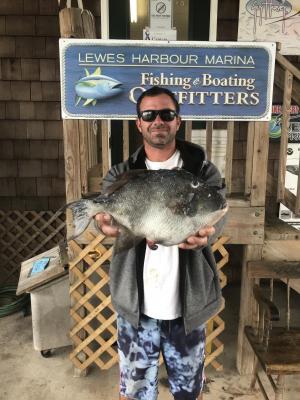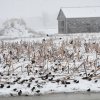Fall is a prime time to fish the surf. The water temperature is falling, the days are shorter, and this encourages fish such as striped bass, blues and false albacore to head to their wintering grounds and feed heavily along the way. At the same time, large schools of bait such as mullet, menhaden and sand eels are also moving, and when the two intercept, the fishing is exceptional.
Unfortunately, this scenario has not played out along the Delaware coats for a few years. I believe the downward spiral began right after Superstorm Sandy, but what has been can also change. So far this fall, I have had good reports from my friends in New Jersey who are catching big stripers close to, if not on, the beach.
The best fishing here will probably begin sometime around Thanksgiving. If you plan to fish the beach, you should plan your attack now and have all of your tackle ready, because the fish may only be here for one or two tides.
I set up four surf rods, and they are in my garage ready to go. Two have fish-finder rigs made with six-inch, 80-pound test mono line tied to a barrel swivel and an 8/0 circle hook. These are my bait outfits, and the rods can toss eight-ounce sinkers and the reels have bait-runner capabilities.
My other two outfits are set up for casting lures. These are lighter than the bait rigs and will be rigged with a Hopkins metal lure on one and a surface lure such as a pencil popper on the other.
Pencil poppers do take a bit of practice to operate correctly. Make the cast, then place the butt of the rod between your legs and take the top of the rod above the reel in one hand. While slowly cranking in line with the other hand, impart a very strong vibration to the lure by shaking the rod tip.
Since I do have a four-wheel-drive truck, I drive the beach looking for signs of fish or bait. If or when I find a promising location, I will stop and either set out my two bait outfits with cut bunker or mullet, or begin casting with the metal or surface lure. If I see bait on the surface with fish chasing underneath, it is popper time. Bait around but no surface activity, and I will try the Hopkins and the pencil popper before going to the bait.
False albacore are easy to spot, but hard to catch. They jump clear out of the water chasing bait and move very quickly along the surface. You have to place your metal lure where they are going, not where they have been. If you watch the birds, you will see them begin to hover around a spot, and most likely that is where the little tuna is going to pop up next. Cast your small metal lure and crank it back as fast as possible. Make sure your drag is set light or the first run will be very short.
For walk-on fishermen, you can get away with two outfits – one set up for bait fishing and one for casting lures. Travel light. I can put everything I need in a five-gallon bucket, including the bait and my lunch.
I would love to tell you some secret spots along Delaware beaches, but there aren’t any. I’ve been fishing these beaches for a very long time, and the hot spot today may be stone-cold tomorrow.
Poaching tog
I received an email from a reader who observed several poachers keeping short tog caught on the southside of Indian River Inlet. The catcher would put the tog in a plastic bag and have the runner carry it back to the car and put it in the cooler.
I know this was a serious problem in the past, but in recent trips to the northside of the inlet I have not seen it at all. If you happen to see someone keeping short tog or breaking any other fish or wildlife laws, please call 800-523-3336.
Clean beaches
The oil spill that fouled beaches from Slaughter Beach to Ocean City has been cleaned up to the best of DNREC and the Coast Guard’s ability. More than 75 tons of debris was removed from the shoreline for proper disposal.
I do not believe this spill will have a lasting effect on the fish or fishing. It seems to have been contained to the shoreline, and while some of it may have sunk to the bottom of the bay, it would not be enough to hamper the fish. This is unlike the spill in the Gulf a few years ago that started from the bottom and stayed there.





















































